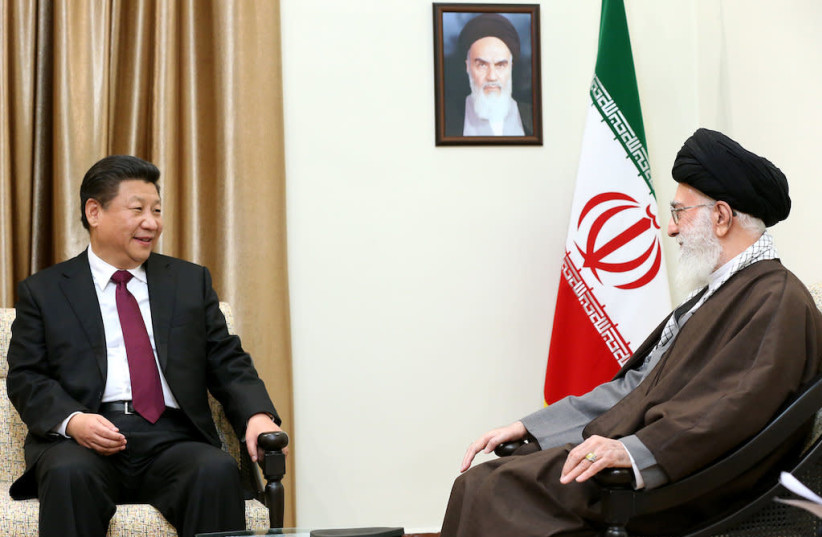Russia and China have cemented their growing alliance and their joint opposition to the United States and NATO during a meeting that took place Friday. This happened as the Olympics start in China. Russian President Vladimir Putin met Chinese President Xi Jinping.
According to reports the two leaders released a statement that said they "believe that certain States, military and political alliances and coalitions seek to obtain, directly or indirectly, unilateral military advantages to the detriment of the security of others."
This was a reference to the US-backed NATO alliance. Russia and China "oppose further enlargement of NATO and call on the North Atlantic Alliance to abandon its ideologized cold war approaches, to respect the sovereignty, security and interests of other countries, the diversity of their civilizational, cultural and historical backgrounds, and to exercise a fair and objective attitude towards the peaceful development of other States," the Kremlin statement said, according to CNN.
This is important because current tensions over Ukraine appear to position the US and some western countries at increasing odds with Russia. Meanwhile other countries want to moderate or work with Russia. For instance Germany appears to want to take a centrist political stance between Russia and the US. This is a legacy of Angela Merkel’s leadership which saw Germany embrace authoritarian regimes such as Russia, Turkey, Iran and China. The statement by China, appearing to back Russia and express concerns about NATO, shows how China is rapidly growing into a more assertive world power. China is now willing to take a stronger stance on issues that ostensibly are confined to Europe.
The growing power of China and its tensions with the West are clear at the Olympics. While China hosts Russia and many other countries, many western countries are boycotting the Olympics by not sending diplomats. According to reports the US, Canada, Australia, New Zealand, UK and India are not sending diplomats. Most of these countries are members of the Five Eyes network. This means many English speaking countries are following suit in not sending diplomats. This is a snub to Beijing. The US and Australia recently signed a new defense deal. The US has also been coming down hard on partners and allies that do strategic business with China in the Middle East.

The diplomatic boycott has meant that those attending the games will have more chances to work together with some western countries absent. This is the new world order on display. Not the new world order of George H.W Bush of the 1990s, but the world order run by China. This is the colossus in the cradle in the sense, a new version of Salvador Dalí’s famous 1943 painting ‘Geopoliticus Child Watching the Birth of the New Man.’ In this version it is China now playing host to 20 heads of state who are attending the Olympics. This is a reminder of the Shanghai Cooperation Organization and CICA councils that took place in Central Asia in 2019.
At the time of those summits I noted that if one wanted to see what a world without US influence looks like, you could have been an observer at the Shanghai Cooperation Organization’s summit in Bishkek, and then gone to Tajikistan’s capital Dushanbe the next day for the Conference on Interaction and Confidence Building Measures in Asia (CICA).
Together, these summits included more than 30 member and observer states and provided a forum for an emerging alliance of Russia, China, Turkey and Iran to discuss regional and global issues without Western powers present. This is important because all of these countries, for different reasons, have faced challenges from Washington in recent years.
Now, several years later, the Olympics is another chance for China to showcase what it has accomplished. Russia, Serbia, Egypt, Saudi Arabia, Qatar, the UAE, Kazakhstan, Kyrgyzstan, Tajikistan, Turkmenistan, Uzbekistan, Argentina and Ecuador are also sending their leaders, according to Al-Jazeera. Footage online showed some of the leaders meeting and having key discussions. They are having the discussions as the major countries of the English speaking world, are absent. These countries have dominated the world over the last century and they include major economies from the G-7 states.
Now they are not in Beijing and their adversaries are talking behind their backs. This is a symbol of an emerging world and how China and Russia will likely work together in the future. This may also have major ramifications for Iran and any new Iran deal. Iran has a new 25-year agreement with China. Countries that may benefit from the Belt and Road Initiative are also at the Olympics with their diplomats.
